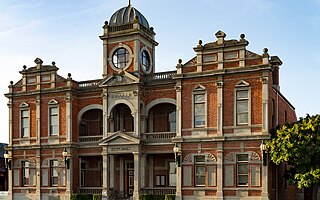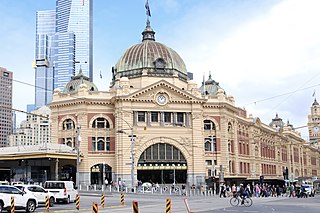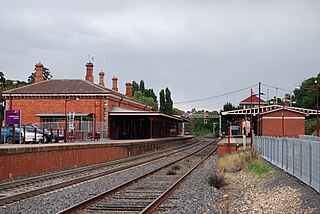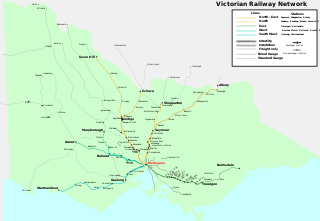Line Guide
Shelbourne Railway Line | |||||||||||||||||||||||||||||||||||
|---|---|---|---|---|---|---|---|---|---|---|---|---|---|---|---|---|---|---|---|---|---|---|---|---|---|---|---|---|---|---|---|---|---|---|---|
| |||||||||||||||||||||||||||||||||||
| Shelbourne | |
|---|---|
| Overview | |
| Status | Closed |
| Former connections | Maldon line |
| Stations | 2 |
| Service | |
| Type | Branch |
| History | |
| Opened | 24 March 1891 |
| Closed | 8 January 1969 as wooden bridges were destroyed by bushfire |
| Technical | |
| Number of tracks | 1 |
The Shelbourne railway line was a continuation of the branch line from Castlemaine to Maldon in Victoria. [1]
Due to the facing junction of the Shelbourne extension, when services to Shelbourne reached Maldon, the locomotive had to change ends in order to run from there to Shelbourne.
The line from Maldon to Shelbourne was opened on 24 March 1891. [2] The line was originally planned to extend about 8 miles (13 km) beyond Shelbourne to Laanecoorie, but work on that section was suspended in 1890. Almost 2 miles (3 km) of earthworks and two trestle bridges had been built before construction was abandoned. [3]
The one intermediate station on the line was called Bradford until May 1919, when its name was altered to Pollard. [4] In late 1936, a proposal to close the Castlemaine-Maldon-Shelbourne line was met with protests. [5] Consequently, the line was not closed, but services were modified such that some rolling stock was allocated to the Echuca line.
A bushfire on 8 January 1969 destroyed a number of the wooden trestle bridges between Maldon and Shelbourne, which were deemed uneconomical to rebuild, forcing the closure of the line. [6]
Shelbourne Railway Line | |||||||||||||||||||||||||||||||||||
|---|---|---|---|---|---|---|---|---|---|---|---|---|---|---|---|---|---|---|---|---|---|---|---|---|---|---|---|---|---|---|---|---|---|---|---|
| |||||||||||||||||||||||||||||||||||

Castlemaine is a town in west central Victoria, Australia, in the Goldfields region about 120 kilometres northwest by road from Melbourne and about 40 kilometres from the major provincial centre of Bendigo. It is the administrative and economic centre of the Shire of Mount Alexander. The population at the 2021 Census was 7,506. Castlemaine was named by the chief goldfield commissioner, Captain W. Wright, in honour of his Irish uncle, Viscount Castlemaine.

The Melbourne rail network is a metropolitan suburban and freight rail system serving the city of Melbourne, Victoria, Australia. The metropolitan rail network is centred around the Melbourne central business district (CBD) and consists of 221 railway stations across 16 lines, which served a patronage of 182.5 million over the year 2023–2024. It is the core of the larger Victorian railway network, with regional links to both intrastate and interstate rail systems.

Woodend railway station is a regional railway station on the Deniliquin line, part of the Victorian railway network. It serves the north-western suburb and town of Woodend, in Victoria, Australia. Woodend station is a ground level premium station, featuring two side platforms. It opened on 8 July 1861.

Castlemaine railway station is a regional railway station on the Deniliquin line, part of the Victorian railway network. It serves the north-western suburb and town of Castlemaine, in Victoria, Australia. Castlemaine station is a ground level unstaffed station, featuring two side platforms. It opened on 21 October 1862.

The Victorian Goldfields Railway is a 1,600 mm broad gauge tourist railway in Victoria, Australia. It operates along a formerly disused branch line between the towns of Maldon and Castlemaine.

Maldon is a town in Victoria, Australia, in the Shire of Mount Alexander local government area. It has been designated "Australia's first notable town" and is notable for its 19th-century appearance, maintained since gold-rush days. At the 2016 census, Maldon had a population of 1,513.

Orbost is a town in the Shire of East Gippsland, Victoria, Australia, 375 kilometres (233 mi) east of Melbourne and 235 kilometres (146 mi) south of Canberra where the Princes Highway crosses the Snowy River. It is about 16 kilometres (10 mi) from the surf and fishing seaside town of Marlo on the coast of Bass Strait and 217 km (135 mi) drive to Hotham Alpine Resort. Orbost is the service centre for the primary industries of beef, dairy cattle and sawmilling. More recently, tourism has become an important and thriving industry, being the major town close to several national parks that are between the east access to either the surf or the snow, including the famous Snowy River National Park, Alpine National Park, Errinundra National Park, Croajingolong National Park and Cape Conran Coastal Park.

The Yarra Valley Railway is a heritage railway operating on a section of the former Healesville railway which operated between Lilydale and Healesville in the Yarra Valley area northeast of Melbourne, Australia.

The Ararat railway line is a railway line in Victoria, Australia. It links the state capital of Melbourne to the cities of Ballarat and Ararat via the Regional Rail Link.

The Wonthaggi railway line is a closed railway line located in South Gippsland, Victoria, Australia. Its primary purpose was to serve the State Coal Mine but the line also provided passenger and general goods services. The line was opened in 1910 and closed in 1978.
The Deniliquin railway line is a broad-gauge railway line serving north-western Victoria, Australia. The line runs from the New South Wales town of Deniliquin into Bendigo, before turning south-south-east towards Melbourne, terminating in Docklands near the central business district. It is a major trunk line both for passenger and freight trains, with many lines branching off from it.
The Mildura railway line is a heavy rail line in northwestern Victoria, Australia. The line runs from Yelta station to Ballarat station via the settlements of Mildura, Ouyen and Maryborough in an approximate south-southeasterly direction. Initial sections of the line opened from Ballarat in 1874 and the line reached Mildura in 1903.
The Strzelecki railway line was a 49 km (30 mi) steam-era branch railway line in Victoria, Australia. The line opened in June 1922, branching off the former Great Southern Railway at Koo Wee Rup Station. The main line branched off the current Pakenham line at Dandenong, extending out into the South Gippsland region.

Maldon is a historic railway station on the Victorian Goldfields Railways Maldon branch line, off the main Bendigo, Echuca and Swan Hill lines in central Victoria, Australia. It was once the junction station for the Shelbourne extension.

The B class are a class of diesel locomotives built by Clyde Engineering, Granville for the Victorian Railways in 1952–1953. Ordered and operated by the Victorian Railways, they initiated the dieselisation of the system and saw use on both passenger and freight services, with many remaining in service today, both in preserved and revenue service. Some were rebuilt as the V/Line A class, while others have been scrapped.

The Robinvale railway line is a freight only country railway line in north-western Victoria, Australia. The line branches from the Mildura line at Dunolly, and at Inglewood the Eaglehawk – Inglewood line connects with the Piangil line outside Bendigo. The parallel Kulwin line junctions from the Robinvale line at Korong Vale then continues northward.
The Noojee railway line is a closed railway line in Victoria, Australia. Branching off from the Gippsland line at Warragul station, it was built to service the timber industry in the upper Latrobe River area, transporting timber as well as providing a general goods and passenger service to townships in the area. The final section of the line between Neerim South and Noojee traversed increasingly hilly terrain and featured a number of large timber trestle bridges. Extensively and repeatedly damaged by bushfires over the years, the line was closed in the 1950s and dismantled. The last remaining large trestle bridge on the line has been preserved and has become a popular local tourist attraction.
The Moolort Line was a cross-country railway line which connected Maryborough and Castlemaine in Victoria, Australia. The line, now defunct, starts in Castlemaine, passes through Campbells Creek, Yapeen, Guildford, Strangways, Newstead, Moolort, and Carisbrook, before joining the Mildura line at Maryborough.
Shelbourne railway station was the terminus of the short Shelbourne branch line, located in the locality of Shelbourne, Victoria Australia. An extension of the line was partially constructed, and was planned to terminate at Laanecoorie, Victoria. This extension was never used, and Shelbourne station was the terminus for as long as the line was open. Some embankments and cuttings of this extension still survive, as do cattle pits and remnants of two trestle bridges that were built over Bradford Creek.
This walking and cycling track runs along Campbells Creek in the town of the same name, Victoria Australia.